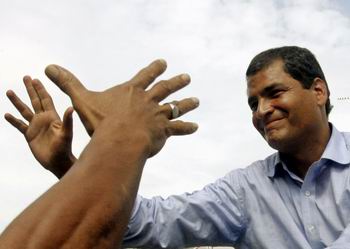“Correa is a left wing populist who has changed the face of Ecuador,” Assange announced in his introduction. “But unlike his predecessors he has a PhD in economics.”
 Correa is a significant president and Assange quotes US embassy cables
released by his own Wikileaks project that say Correa is the most popular president
in Ecuadorian history. He was also taken hostage in a 2010 coup d’etat. Assange said Correa blamed the coup on
corrupt media and launched a counter-offensive on the grounds the media define what
reforms are possible.
Correa is a significant president and Assange quotes US embassy cables
released by his own Wikileaks project that say Correa is the most popular president
in Ecuadorian history. He was also taken hostage in a 2010 coup d’etat. Assange said Correa blamed the coup on
corrupt media and launched a counter-offensive on the grounds the media define what
reforms are possible.Assange asked Correa Ecuador’s relationship with the US. Correa quoted Bolivian president Evo Morales who said the US is the only country in the Americas safe from a coup because it doesn’t have a US embassy. Assange admitted to Correa he liked his jokes. Correa suddenly got serious and said the only way he could eliminate funding US provided to Ecuadorian police was by increasing their salary. "I'm not anti-American, I got two degrees there but Iwould never allow Ecuadorian sovereignty to bcompromised by the US". Correa said he wanted Wikileaks to release all the cables as they had nothing to hide.
Assange asked about kicking out the US ambassador after the
release of the cables. Correa said Heather Hodges was right wing with
1960s cold war attitudes. Hodges accused Correa of deliberately appointing a
corrupt police commissioner. She didn't like the government and her main contacts
were leaders of the opposition. The cables confirmed what they already knew. As Hodges was shown the exit door, Correa grew relationships with
China, Russia and Brazil in her stead.
Assange brought the subject back to freedom of information as he reminded Correa why he was 500 days of house arrest. Were Correa’s reforms were a step in the wrong direction for release of
information?
Correa replied he was all for release of information. He mentioned an Argentinean book about Wikileaks which said Ecuadorian media did not publish. He has long supported Wikileaks. “We believe, my dear Julian, that only things that should be protected against freedom of speech are those set in the international treaties,” Correa said. Correa said media power is greater than political power in Ecuador. “They usually have self-serving political, economic, social and above all informative power,” he said. He claimed the government were persecuted by journalists using insults and slander – mass media serving private interests.
Correa replied he was all for release of information. He mentioned an Argentinean book about Wikileaks which said Ecuadorian media did not publish. He has long supported Wikileaks. “We believe, my dear Julian, that only things that should be protected against freedom of speech are those set in the international treaties,” Correa said. Correa said media power is greater than political power in Ecuador. “They usually have self-serving political, economic, social and above all informative power,” he said. He claimed the government were persecuted by journalists using insults and slander – mass media serving private interests.
With most TV stations owned by bankers and no public
station in Ecuador, he faced merciless opposition to any banking reforms. “These people
disguised as journalists are doing politics for fear of losing the power they
always had,” Assange said he agreed with
his market description of the media which had censored Wikileaks material for
political reasons. However he said the correct way to deal with monopolies or
cartels to break them up. He asked could Correa have made it easier for new entrants.
Correa said that was what they were trying to do was making one third of TV stations for the community and non-profit, one third
commercial and the final third state owned by governments and councils. He said
his 2008 law has been systematically blocked by big media and their lobbyists.
Correa said Ecuador and Latin America are moving from the Washington Consensus.
“The policies dictated by the US had
nothing to do with our needs in Latin America,” Correa told Assange. Correa said governments had to
put people before economic politics. He told Assange it was a
pleasure to meet him in this way,
“Cheer up, welcome to the club of the persecuted,” Correa said.
“Thank you,” Assange replied. “Take care and don’t get assassinated.”
“That’s something we have to avoid every day," Correa replied.
“Cheer up, welcome to the club of the persecuted,” Correa said.
“Thank you,” Assange replied. “Take care and don’t get assassinated.”
“That’s something we have to avoid every day," Correa replied.

